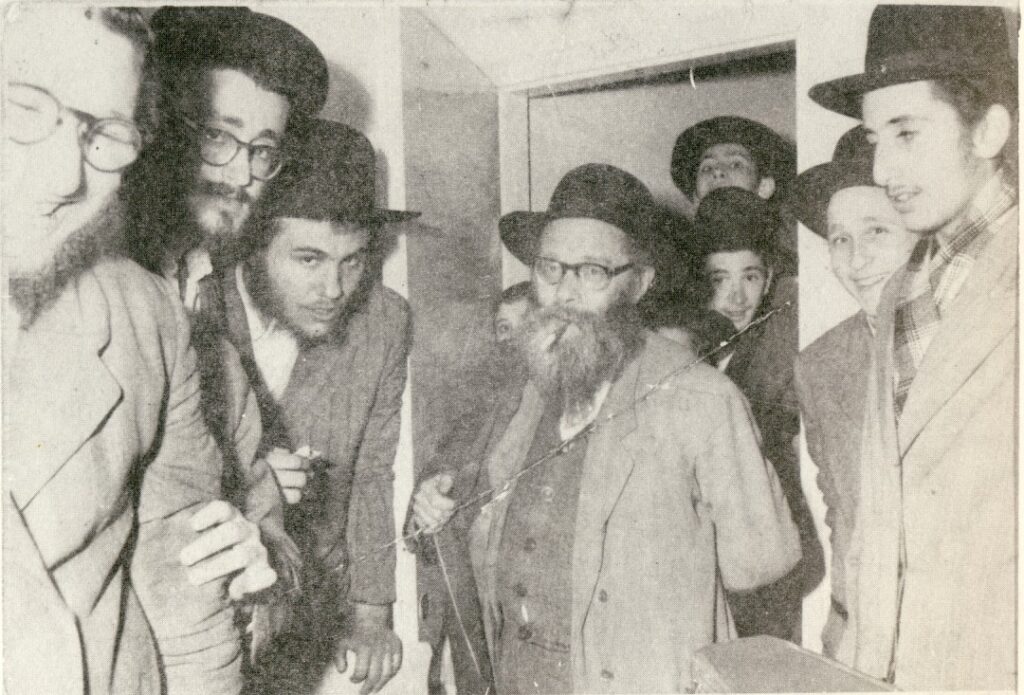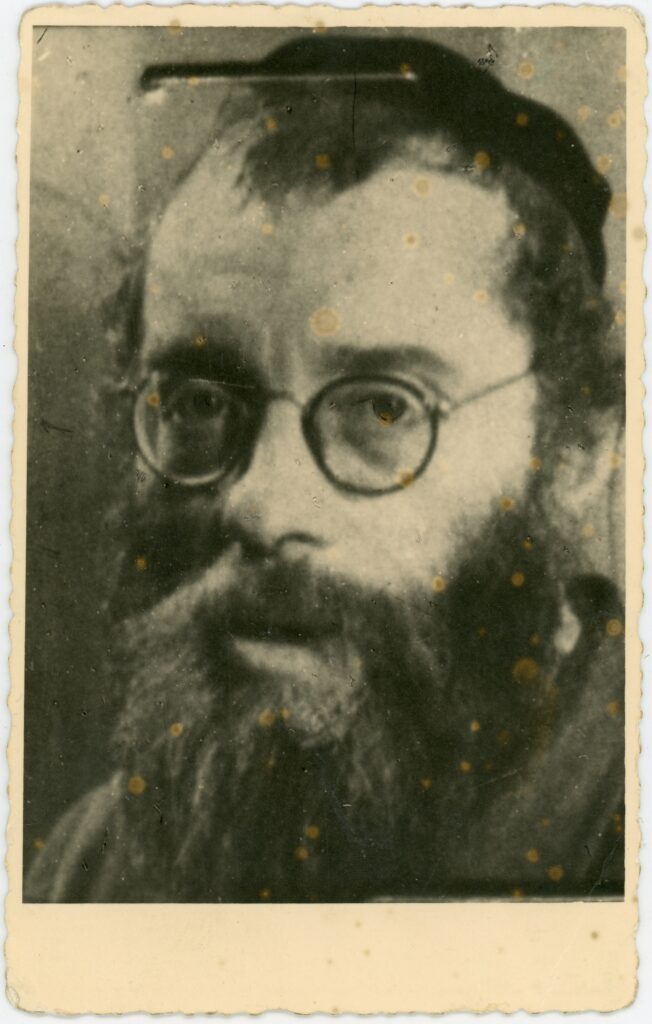A Beacon of Light, Joy, and Faith
The genius chassid Rabbi Gad Eisner z”l, overseer of the Chidushei Harim yeshiva
Commemorating his 40th yahrzeit (anniversary of passing)
Adar 24, 5745 – Adar 24, 5785

For decades, Rabbi Gad served as a bridge between past generations and the younger generation, leaving a strong imprint of holiness and exaltation in the hearts of thousands of his students and associates. Streams of faith from the lives of souls flowed from his light and watered Israel with a pure and bright light of trust and the closeness to G-d in every situation.
During the Holocaust, in which he lost his wife and only daughter, he went through the Nazi hell with faith and peace of mind, and was engaged in education even while he was in the Valley of the Shadow of Death. In the Lodz Ghetto, he organized with other educators to establish a Talmud Torah school within the ghetto, where they would study Tractate Chulin, the Book of Proverbs, and matters of holidays and festivals.
From Lodz he was sent to the camps of Częstochowa, Buchenwald, Colditz, and finally to Theresienstadt, from where he was liberated.
During his time in the camp, he would often repeat the words of book Duties of the Heart: “It is said of one of the chassidim, who would get up at night and say: My G-d, you have made me hungry, and You have left me naked, and in the darkness of the night You have made me sit, and Your strength and greatness have set me on fire. If You burn me with fire, I will not continue – except to love You and rejoice in You.”
At the end of the war, he was led on a death march, and survived it too. He later said that he almost collapsed on the march until he heard someone behind him shouting “Gad’l loiif” (Gad’l, run!), and this phrase gave him the strength to continue, and thus he escaped beign shot to death. He used this story extensively in an educational manner to teach how a word from a young man to his friend can save his life.
After the war, he returned to Lodz, gathered around him child survivors, and established a Talmud Torah for them, devoting his life to preserving the embers of Judaism among them. From the year 5710 (1950), he lived in Paris, and there he also engaged in educational, charitable, and kindness initiatives.
Rabbi Gad expressed in his personality all that was good and beautiful in chassidic Poland that was destroyed. Always happy, always content, always calm, always attentive to the plight of others.
Rabbi Gad was a worshiper of God with every fiber of his soul, a genius and a pious man, and an educator with supreme grace. The great and righteous of the generation spoke of him with admiration, and encouraged the young people to gather under his shadow and hear Torah and mussar (morality lessons) from him.

Rabbi Gad’l Eisner and his student
Most astonishing was his faith and sincerity. Rabbi Gad’l did not receive the opportunity to be rebuild (a family) after the horrible days, but the smile never left his face and he was always cheerful and happy, helping and assisting everyone, as if he lacked nothing and his whole life was cushioned and propelled like a ship sailing on calm waters.
The holy Rabbi Simcha Bunim of Ger chassidism said of him: “Er is a mechanech fun mechanchim” (He is an educator of educators). This statement, which was said to his brother, the Beit Yisrael rabbi of Ger, was very fitting for his personality, which was all about education from a pure heart and positivity.
And thus, the Pnei Menachem rabbi said on Rabbi Gad’s shloshim (30 days since burial): “As one of those engaged in the sacred work of education, I feel the absence of Rabbi Gad’l the most… I, who was privileged to know [the previous generation], feel the absence of an educator like Rabbi Gad’l the most, an educator from the previous generation… When an educator like Rabbi Gad’l departs from the world, how many wholehearted educational forces will be missed. Rabbi Gad’l was focused on education, his entire essence was embodied in matters of education. Rabbi Gad’l was always engaged in searching for the truth, in discerning the true nature of the current situation. This is true in all matters, but especially – in what all the great men of the generations were engaged in – in the war of inclinations… It can be said with full confidence about Rabbi Gad’l that he was like the zehuma listeron (a utensil with a fork on one side and a spoon on the other) of his many disciples. He always sought to cleanse the impurity.”
After his passing, his books appeared, which quickly became bestsellers, and these are their names: “Moreshet Gad” – five volumes on the Torah and the festivals from his talks, published in Bnei Brak in 5760 (2000) by the Moreshet Gad Institute; MiMishnato Shel Rabbi Gad’l” – his mishnah thoughts and teachings arranged by topic; “BeMechitzat Rabbi Gad’l” – his life story of dedication, holiness, and faith.

Rabbi Gad’l Eisner upon his arrival in Israel
On the 24th of Adar, as we mark the fortieth year since his passing, we light a candle for the ascencion of his soul, reflect on his teachings, and talk about his wonderous life.
Genius in Kindness – A Story
After WWII, Rabbi Gad Eisner z”l’s interests were focused on the youth who survived the war, and on increasing kindness to the survivors. He wrote wonderful chapters on this subject together with his colleague and good friend, Rabbi Itche Leizer z”l.
A typical example of their kindness initiatives from those days can be seen in an incident that occurred while they were in Paris: a respectable Jew, whom they knew as a kind-hearted man, was penniless. Later, they learned that a synagogue on the outskirts of the city was looking for a “cleaning person.” They both went and offered their acquaintance the position, and the Parisian synagogue happily accepted his candidacy.
However, the work of cleaning was carried out by both Rabbi Gad’l and Rabbi Itche, every morning, while the respected Jew came and told them that the aforementioned synagogue was seeking to accept him as a rabbi and rabbinical decisor if he would only accept… And so, the latter received his salary in full, thinking that he was a rabbi, and would give the members of the community a lesson every day, while Rabbi Gad’l and Rabbi Itche, every morning, took care of the cleaning of the synagogue a little.
Once, Rabbi Gad’l said with his endearing smile, there was almost a mishap… The gabbai (manager or assistant in a synagogue) at that synagogue wanted to change the cleaning days and therefore turned to that “rabbi” to update us on the new cleaning rules… By the grace of G-d, the rabbi did not understand French and the rabbi did not speak Yiddish, and Rabbi Gad’l was called to ‘mediate’ between the two again, and saved the situation.
(From his life stories in the book “MiMishnato Shel Rabbi Gad’l”)
Link to listen to some of his lectures (in Hebrew): https://www.kolhalashon.com/New/RavDaf/RavInfoD.aspx?RavID=1457














